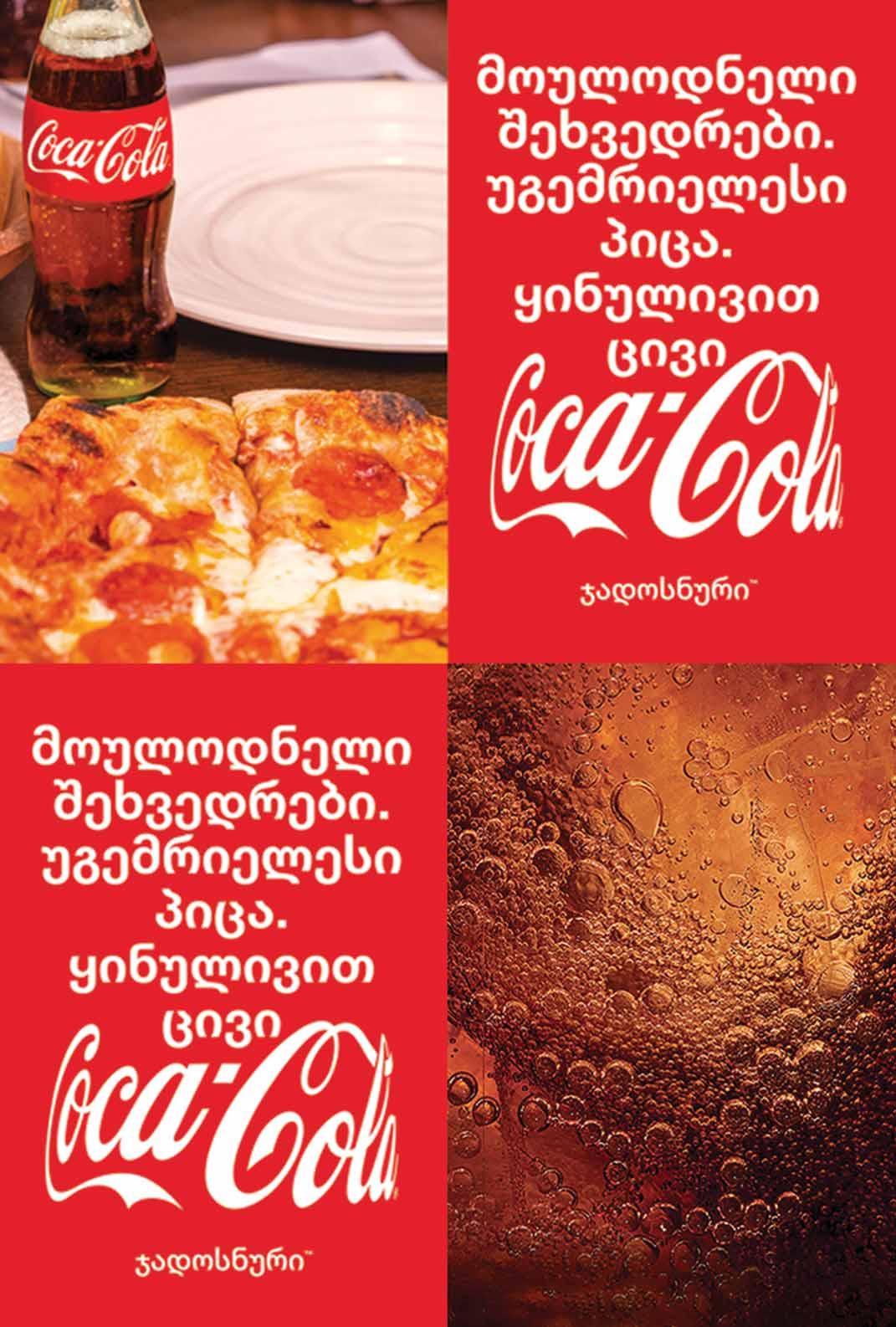




Despite challenges and uncertainties, three of our partner countries –Ukraine, Moldova and Georgia – have now started their EU accession, which is a clear recognition of the effectiveness of the Eastern Partnership policy in bringing these countries closer to the EU, – said Olivér Varhelyi, Commissioner for Neighborhood and Enlargement in his address to the Euronest Parliamentary Assembly in Brussels on Wednesday.
Here is the transcript of the Commissioner’s video message, as delivered for the Euronest PA opening:
“Honorable members of the parliament, and distinguished guests, it is a pleasure to address the 11th session of the Euronest Parliamentary Assembly. Let me start by thanking you for your long-standing commitment to the Eastern Partnership framework particularly in this challenging time. As Russia’s war against Ukraine continues, the EU stands firmly in solidarity with Ukraine and the Ukrainian people as they defend their freedom. We will not tire in our efforts to support Ukraine.
“We have also seen a challenging era in the South Caucasus, with the displacement of over 100 thousand people from Nagorno Karabakh. The EU and its member states work quickly to provide humanitarian support, to address the emergency needs of refugees. We are also working with the Armenian government and international financial institu-
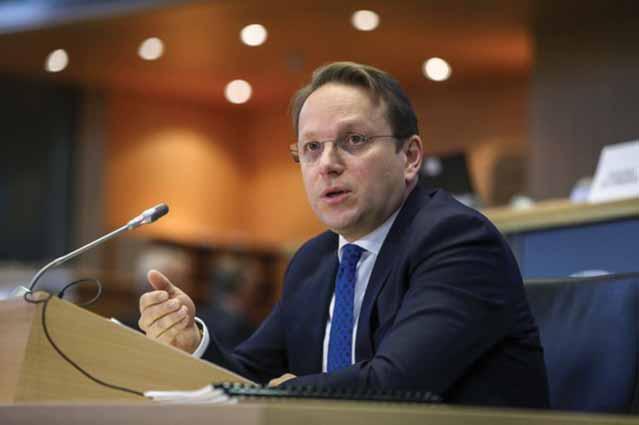
tions to help them long integrate, including housing. “At the same time, there is still an opportunity to achieve sustainable peace in the region. The EU stands ready to
continue with mediation, and we are also ready to invest in cross-border connectivity when conditions allow for delivering benefits to all people in the region. Based on our leaders and guid-
ance, we have also been working on strengthening our relations with Armenia and step up security cooperation, sectoral work and investment. COP 29 in the horizon, we also have a solid agenda
with Azerbaijan to move toward a green transition and invest further in renewables.
“Let me also welcome representatives of Belarusian civil society who continue to show remarkable resilience in the face of the Lukashenko regime’s brutal crackdowns. The EU support for the people of Belarus has been of unquestionable priority. It includes the support of civil society in a variety of sectors as well as supporting the democratic opposition in exile.
“Despite these challenges and uncertainties, three of our partner countries – Ukraine, Moldova and Georgia – now started their EU accession which is a clear recognition of the effectiveness of the Eastern Partnership policy in bringing these countries closer to the EU. Fifteen years after its creation, Eastern Partnership continues to deliver meaningful results across different areas making a difference in the lives of citizens in the region. The Eastern Partnership is also adapted to fast-evolving challenges by becoming a flexible and strategic regional dialogue cooperation framework.
“In this context, we have stepped up our engagement in security, good governance and socio-economic recovery as well as investing further in green and digital transitions, energy independence and health resilience. Through the Eastern Partnership, we are also supporting our accession partners in the region and making progress on the enlargement path,” he said.
Various types of Georgian wine from 50 Georgian companies were presented at the TEXSOM competition and 25 of them won – one won platinum, five gold, ten silver and nine bronze medals.
Organized by the National Wine Agency of Georgia, within the framework of the three-day TEXSOM conference planned for August 2024, a large-scale presentation of Georgian wine will be set up for experts and professionals of the wine industry.
The Texas Sommelier Conference TEXSOM was founded in 2005 to raise professional standards and education
for local sommeliers. The conference later turned into one of the most important international events in the field of wine. Since 2014, an annual international wine competition has been added to the conference, the jury of which includes wine professionals and sommeliers from different countries of the world.
***
Texas Sommelier Conference TEXSOM was founded in 2005 to raise professional standards and education for local sommeliers. The conference later turned into one of the most important international events in the field of wine. Since 2014, an annual international wine competition has been added to the conference, the jury of which includes wine professionals and sommeliers from different countries of the world.

Source
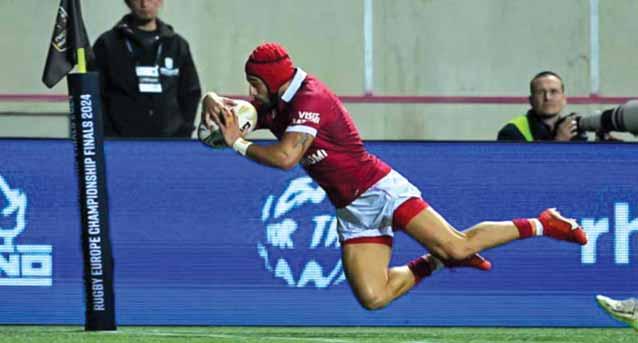
Continued from page 1
Nominated candidates can receive support with 76 votes twice, after which the successful candidate will hold office for five years. If 76 supporting votes cannot be gathered, the matter will be transferred to the President to decide on. The President can appoint candidates from the list provided by parliament for a term of five years.
The amendments also involve changes to the regulations of parliament, specifying that the Parliament Speaker will announce the candidate selection competition instead of the President. The Speaker will also present nominations for the CEC Chair and its members to parliament. Notably, the position of deputy chairman of the CEC, who was to be appointed by the opposition quota, is to be abolished.
"Recent amendments to the Electoral Code, including those adopted in the third reading on February 20, 2024, when the delegation was in Georgia, do not comply with the recommendations of the Office for Democratic Institutions and Human Rights of the Organization for Security and Cooperation in Europe (OSCE/ODIHR) and the Venice Commission, and may further reduce confidence in the CEC,” the National Democratic Institute stated in a report released February 26.
The President’s 11-page motivated remarks, vetoing the amendments submitted to Parliament, also referred to the OSCE/ODIHR recommendations.
Among her remarks, she said that, based on the amendments, the President’s role in presenting candidates for chairperson and members of the CEC remains lim-
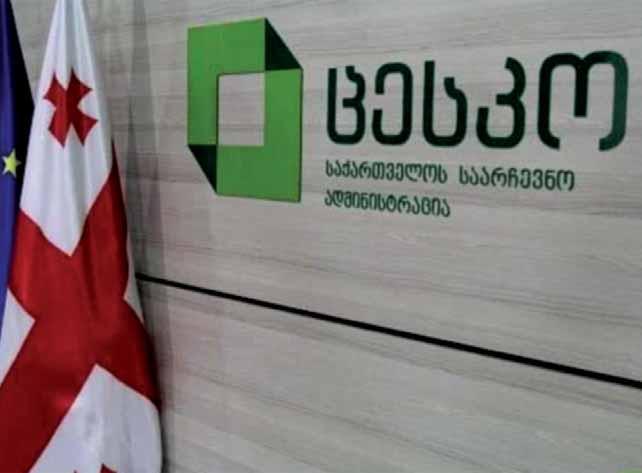
Source: Civil.ge
ited. She notes that adding a passage to the February 20 legislative amendments that "if parliament fails to elect a candidate twice consecutively, once by 3/5 and then 1/2 of the majority, will then hand the issue to the president," does not increase the President’s quality of
involvement, since it is unlikely that parliament will not be able to elect a candidate.
President Zurabishvili proposed announcing an open competition for the post of CEC Chair and members before May 1, 2024, whose 6-month and 5-year
duty terms have expired. She also suggested establishing a competition commission to deal with relevant procedures. Parliament Speaker Shalva Papuashvili said the President’s motivated remarks were devoid of ground and no veto was possible, since the bill included amend-
ments to the regulations which were enacted one month prior, and which had already been signed by the Parliament Speaker.
Papuashvili denied allegations that the amendment contradicts European standards and the opinion of the Venice Commission, nor is it, he claims, in conflict with the EC’s nine steps, since the recommendation under the fourth point is to hold elections fairly, in a competitive environment.
The Speaker criticized the President’s veto, saying it would motivate the opposition to protest October’s election results. He claimed that the opposition MP’s appointment as the chairperson of the election administration was a “scheme.”
“We see the pressure exerted on the CEC chairperson, be it from the media, the opposition, or the non-governmental sector. They desire to remove him from the chairmanship and have the Lelo party hold the elections,” he said.
Papuashvili said he believes President Salome Zurabishvili's only motive is to give “an excuse” to the United National Movement not to recognize the results of the elections for the fourth time. He said that eight opposition parties were represented in the CEC, and the speculation of the single-party support of the CEC chairperson was a blatant lie.
“Parliament is a supreme legislative body, and the majority is elected by the majority of the Georgian people. This is a democracy, and any suggestion otherwise is fiction. Elections will be held on October 26, and you will see on October 27 that this would have been a pretext for non-recognition of the election outcomes,” he said.
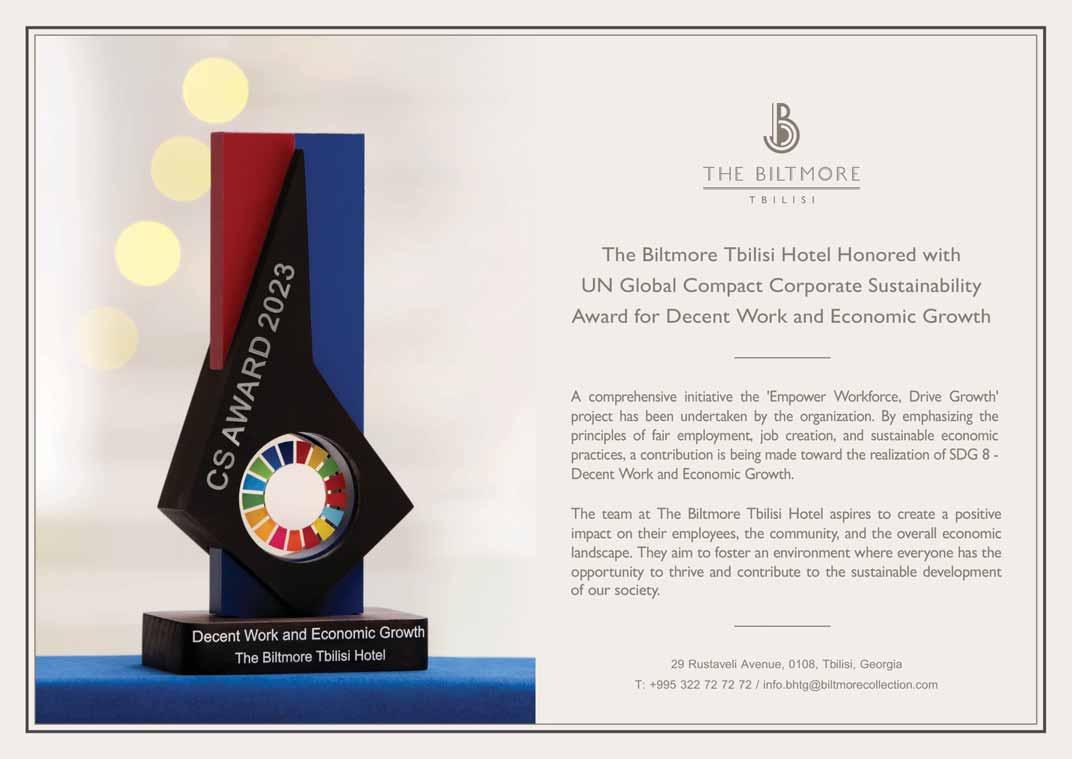
Today, the entire country anxiously awaits the upcoming parliamentary elections, set to take place in October, seeing the nation’s attention, energy, intellectual potential and moral standing currently fully channeled toward them. The overall predominant thought is that the incipient electoral social, political, and possibly economic effect can and will change our lives so drastically (and mostly to the best) that, as a result, we will not have anything more to do but sit back and enjoy the felicitous outcome of the voting. As a matter of fact, this is not just an indigenous Georgian phenomenon of public character; the United States (or any other country to wit) acts in the same exact way: Americans, like us Georgians, are likely living in high hopes that the November presidential election will be wrought with the power to alter their lives for the better.
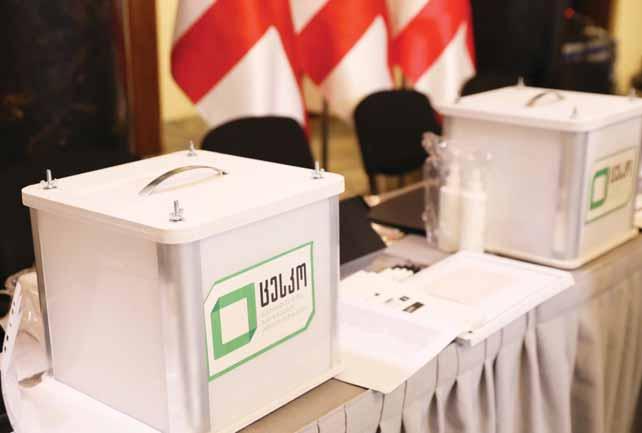
Ballot boxes. Source: parliament.ge
prospect of anything new and different coming up to substitute democracy in terms of ruling human existence. That’s why we have settled so steadily and comfortably with the principles and ideals of democracy, not even budging an inch from its rules and regulations - and elections are one of those items in the democracy rulebook.
Whatever this judgement might suggest, the main question remains untouched: if the elections are not prone to introducing any tangible changes to our lives, why should we make such a big deal out of them? Well, this is exactly what constitutes the main pain in the neck when it comes to the democratic arrangement of our lives. Yet, if we learn how to make the elections reasonable, fair, honest, faultless, and beneficial to the nation as a whole, then there is a chance that we can put up with it for a while longer, at least until something stronger is invented in our prospective robotic world. For now, as we ready to make the best choices of our lifetimes this coming October, the best thing to do might be to not use only sentiment and attitude when standing before that magic ballot-box, but smarts and calculation, too.
Then why do we use so much time, energy and money on a prospect that matters so little, you might ask.
The answer is prompt and easy: This is what democracy is all about, and nobody has so far invented anything more suitable and optimal to put together
Yet, those electoral promises and hopes are usually far removed from what actually happens as a consequence of the voting effort. At the end of the day, the entire pre-electoral din and racket, and the vote-counting hullabaloo, rarely turns out to be worth the electoral struggle we undertake throughout the exultant process. Indeed, it generally happens, when everything is over for another four years and all goes back to its old routine, that we discover with certain reservation that not much has changed in our personal lives, wallets or refrigerators.
and govern a human life. This is what you call the structure of the current Social Contract! Sakartvelo is living and developing together with the rest of the world, the majority of which has given preference to democracy, consent of the governed thereof, and to freedom of choice. The interesting invention called
democracy is not fresh out of human imagination: The idea belongs to ancient times, has survived through centuries, and has reached us contemporaries safe and sound, although there do pop up sporadic controversies concerning its modern value and rationality. So, we are where we are and there is no current
The West is watching after our electoral behavior, and it seems the fairness in the process is almost guaranteed. But when we are faced with that ballot sheet, all by ourselves, the choice is ours alone. That’s where we need to use our brains to give the nation better leaders and decision makers than we have ever had before. Is this possible? Yes, it is, but only if we take Sakartvelo’s future very seriously.
The visit of NATO Secretary General Jens Stoltenberg to Georgia began on March 18, when he arrived from Azerbaijan. The Georgian Foreign Minister, Ilia Darchiashvili, and the Georgian Ambassador to NATO, Viktor Dolidze, were at Tbilisi airport to greet him.
During his short visit, the NATO Secretary General met with President Salome Zurabishvili and Prime Minister Irakli Kobakhidze.
Georgian President Salome Zurabishvili hosted him at the Orbeliani Presidential Palace, where she spoke to him about Georgia’s integration into the Euro-Atlantic structures and its progress on this path.
Their conversation also touched on Russia’s aggression in Ukraine, the solidarity of the international partners and community with Ukraine, the impact of Russia’s aggressive moves on the region, increased threats, and Black Sea security.
Speaking about Georgia’s occupied regions, President Zurabishvili highlighted the issues of the Bichvinta summer houses, the Ochamchire militarynaval fleet, and Sokhumi airport. She also emphasized that the holding of Russia’s presidential elections in Georgia’s occupied regions was “totally unacceptable and unlawful, once again grossly undermining Georgia’s territorial integrity and sovereignty, and contradicting international norms.”
Stoltenberg, throughout his visit, reiterated unwavering support for Georgia’s territorial integrity and sovereignty.
“Georgia is one of NATO’s closest partners. We highly appreciate your substan-
tial contributions to NATO missions and operations, and we fully support Georgia’s sovereignty and territorial integrity,” he said.
“South Ossetia and Abkhazia are parts of Georgia. NATO continues to call on Russia to reverse the recognition of Georgian territories as independent states. Russia’s organization of elections in the occupied parts of Georgia and Ukraine is completely illegal. Russia’s presidential election was clearly neither free nor fair.”
At the joint briefing with Georgian Prime Minister Irakli Kobakhidze, NATO Secretary General Stoltenberg emphasized the importance of the partnership between NATO and Georgia, particularly in addressing security challenges in the Black Sea region.
“At our meeting, we addressed security in the Black Sea, which matters for both Georgia and NATO,” he said afterward.
“Russia’s war put freedom of navigation on the Black Sea at risk, and threatened global food supplies. But with our support, Ukraine has pushed back, destroying or damaging a significant part of Russia’s Black Sea fleet. Ukrainian success has allowed them to reopen grain shipping which is vital for the economy and global food security.
“NATO’s partnership with Georgia is strong, and today we discussed how to develop it even further. In January, we agreed to a new individually tailored partnership program to deepen the partnership between Georgia and NATO. And I welcome the progress made in areas like crisis management, cybersecurity, and military engineering.
“Just a few days ago, a Turkish navy frigate visited Batumi as part of NATO’s training for the Georgian coastguard, and this is one example of how we do practical things together to help you
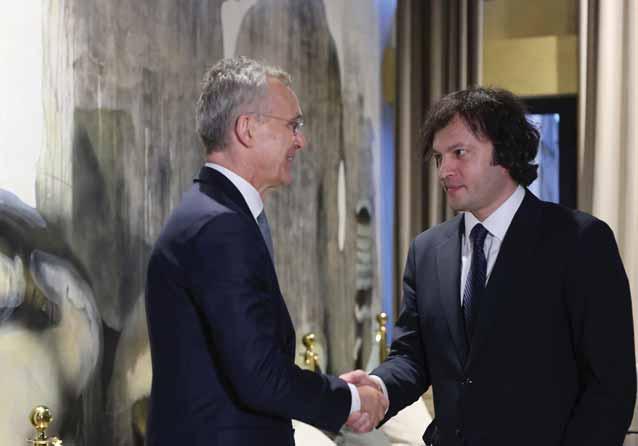
strengthen your naval capabilities, which is important for Georgia, it’s important for the Black Sea, and it’s important for NATO,” he stated. Stoltenberg highlighted that NATO stands by Georgia’s side.
“NATO stands by your side as you continue your path towards stronger democracy and full Euro-Atlantic integration, including the 2008 Bucharest decision that Georgia will become a member of the NATO Alliance,” he said,
noting that Georgia needs to continue its internal reforms.
“The candidate status granted by the European Union is a major opportunity to enhance your stability and prosperity. And what you do to move toward EU membership goes hand-in-hand with efforts to become a full NATO ally.
“It is important that Georgia continues to strengthen domestic reforms, democratic values and the rule of law, including through free and fair parliamentary
elections in October this year.
“So, Prime Minister, I welcome the fact that you just a few weeks ago visited Brussels. Now I’m here, and it demonstrates that we have an active political dialogue as part of our partnership,” the Sec Gen said. “Thank you again for your hospitality, and thank you for your personal commitment to the NATO-Georgia partnership.”
Jens Stoltenberg departed for Yerevan, Armenia, on March 19.
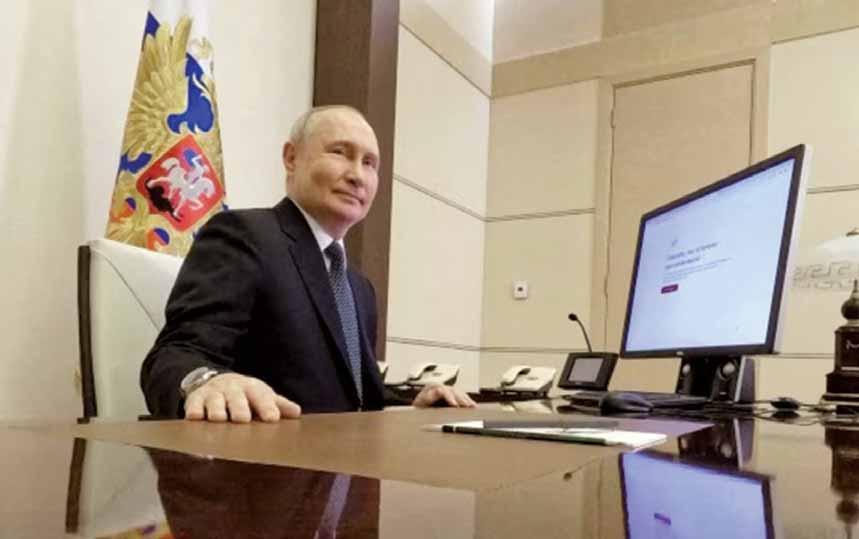 INTERVIEW BY VAZHA TAVBERIDZE
INTERVIEW BY VAZHA TAVBERIDZE
Robert Service, one of the UK’s foremost Russian History specialists, biographer of Lenin, Stalin, Trotsky, Tsar Nicholas II, and chronicler of Putin’s first 20 years of rule, sat down with Radio Free Europe/RL’s Georgian Service to talk about the force that is Putin.
YOU WRITE THAT RUSSIA'S PAST IS LIKE PUTTY IN PUTIN’S HANDS - HE SHAPES IT AS IS HIS WONT. BUT WHAT ABOUT ITS FUTURE?
Anybody who tells us that they know what the future is, is a fool. Who could have said in 1916 the future of Russia for the next 70 odd years would lie with the communists?
It's definitely a more brittle future. The very fact that Putin has manipulated the Constitution and distorted the politics and impose extreme authoritarian rule, and personalized it all to such an extreme degree, means that he is exposing himself to the possibility of different methods being used to get rid of him: An explosion of popular discontent or an eruption of elite discontent, both of these are possibilities created by personalizing his dominance.
WHAT WILL IT TAKE FOR CHANGE TO COME TO RUSSIA? IN 2007, BORIS BEREZOVSKY SAID THAT RUSSIA'S AUTHORITARIAN REGIME COULD BE BROUGHT TO AN END ONLY BY FORCE. HAS TIME PROVEN HIM RIGHT?
I had lots of disagreements with Berezovski. I don't think he was a great judge of possibilities. If the war goes badly, then Putin's undoubtedly in trouble, because he bullied his own security council into accepting the first steps towards that war just a few days before it happened. That's one possibility. The other possibility is a continuing downturn in the economic situation. Russia has economic difficulties. The concordat between the Russian president and Rus-
Putin is already slipping: geostrategically, geoeconomically, geopolitically
sian people, since 1991, has always been that the president, through the Duma, guarantees a certain minimal level of welfare, however autocratic. Putin has become, and by golly, has he become autocratic, but he has looked after that minimal level.
Putin knows how riotous Russians can easily become - I mean, look at the pensioner riots of 2012. He knows what Russians are capable of when they're pushed to extremes. So, he's got to keep the economy up to a level sufficient to go on paying off the people on whose votes he depends, whose acquiescence he depends on even more, because votes, of course, are not really a great criterion for reality in Putin's Russia.
AT THIS RATE, WHEN SHOULD ONE EXPECT CHANGE IN RUSSIA? AFTER PUTIN DIES? AND WHERE WILL THIS CHANGE COME FROM – INTERNALLY, OR FROM OUTSIDE?
Well, a lot of the pressure has been exerted already from outside, and it has not yet significantly undermined Putin. I've always thought that the main pressure will have to come from inside Russia. It doesn't look as if the dominant business elite have got the guts to stand up to him. Going back to 1917, then the business elite did break away from the monarchy. And that was one of the factors that led to the abdication of Nikolai the Second. At the moment, it looks as if they are still gaining enough from the state contracts that Putin is spraying on
them in wartime for them not to be tempted to move against him. It would be tricky anyway, because Putin's Russia is much more controlled than Nikolai the Second’s Russian empire ever was. So it will be difficult for the business elite to turn on him.
And why would the security elite turn on him? Well, that could happen when the war goes badly and somebody has to be the scapegoat. And he's the readiest scapegoat of all, because he is the prime motivator of this special military operation.
WHEN YOU SAY “WHEN THE WAR GOES COULD BADLY,” SHOULD IT PERHAPS BE MORE OF A QUESTION OF “IF” THE WAR GOES BADLY?
My own judgment is that, at the moment, we're in for a protracted stalemate. One of the massive misjudgments that Putin has made is that he could so easily overrun most of Ukraine. He massively underestimated the Ukrainian patriotic spirit and determination. And he might have sacked several FSB officials for supplying him with incorrect ratings of the American or Ukrainian opinion, but it's his own fault.
He also made a massive misjudgment about NATO. With the intention of diminishing the outreach of NATO, he's actually added to the number of countries in the alliance. Geo-strategically, it is a disaster for Russia.
BACK TO THE QUESTION OF CHANGE. WHEN YOU SAY THAT IT'S BOUND TO COME FROM INSIDE, WHO DO YOU HAVE IN MIND?
At the moment, there’s no obvious candidate, but there are some ruthless, clinical minds in the entourage around Putin, and some surprises could happen. Let's go back to 1953, when the man who had been judged to be a reliable Stalinist, Lavrentiy Beria, proved to be the most radical of the removers of Stalin's legacy as soon as he was dead, playing a part in making sure that he didn't get the medical assistance he needed to live.
So even Nikolai Patrushev might take the clinical view if he sees it’s not working out. At the moment, it seems that he
is himself just as much an imperialist fanatic as Putin is. But when your personal security is challenged, you can quickly change your mind.
SO IT'S ABOUT THE MOMENT WHEN PUTIN SLIPS?
Yes. I think he's slipping, geo-strategically, already. Geo-economically, geopolitically, too. That's really why he needs to strengthen, as he's doing, the authoritarian bulwarks of his power. If he was truly confident that no one could move against him, he wouldn't be acting like this maniac autocrat.
YOU WROTE “THE KREMLIN WINTER,” WHICH ANALYZED PUTIN'S FIRST 20 YEARS IN POWER. WHEREIN LIES HIS POWER AND WHAT'S THE SECRET TO HIS LONGEVITY?
Well, I think we have to give it to him that he managed to put forward an ideology of Russian patriotism that struck a chord with most Russians. The public opinion polls can be laughed at, because they obviously exaggerate his popularity, but he did give Russia back its pride. He himself started out as a more respectable political figure than Yeltsin was. He organized patriotic events in his country, he welcomed world football, world motor racing, and other events into Russia. He gave Russians a sense of self pride again, something they'd lost in the decade after the fall of the Soviet Union. I think this should not be underestimated.
We have to give it to him that he managed to put forward an ideology of Russian patriotism that struck a chord with most Russians
While most Russians acquiesce to his power, they prefer to turn a blind eye to the nastiness of the Putin regime if it doesn't affect them, personally, if they're not conscripted into the army against their will, nor their sons. Yet, I think there is reason to feel that Russians might decide that self-pride might eventually involve doing without Putin the autocrat. It could happen.
That’s a really tricky question. What could the Russians have done? I think we have to remember how difficult it would be for them to rebel. This has actually been the fate of Russians for more than 200 years: It is very, very difficult for them to rebel.
Putin has enough of a historical memory; he was trained as a security official; he surrounded himself, especially in the earlier years of his power, in the 2000s, with people he knew from the KGB, and his ideology gradually formed very firm foundations, in the way that security officials normally think about politics. I think that's got a lot to do with what is happening now.
He might have been a different man if things had turned out differently in the early 2000s. Perhaps the West could have handled them differently, but I rather doubt it. I think that underestimates how much of a KGB mentor mentality he was carrying around while charming Tony Blair and George Bush, Jr. I think it was going to come out sooner or later.
Russians who have stood up to him get removed from politics. He started doing it very, very subtly over a number of years. And he gave Russians a vision of one great Russia, “Make Russia Great Again,” this was without him actually expressing it. And he has militarized the country by stealth.
WHEN RUSSIANS DO MUSTER UP COURAGE AND CHANGE HAPPENS, IT IS USUALLY FOLLOWED BY DARK TIMES – TAKE POST-1917 REVOLUTION AND THE 1990S AFTER THE PERESTROIKA. HOW DOES KNOWLEDGE OF THAT PLAY A ROLE IN THE RUSSIAN MINDSET?
This has been the fate of Russians for more than 200 years: It is very difficult for them to rebel
I’m sure it does. I think most Russians have learned from their parents, or from their grandparents, how awful the situation can become when the lid is pulled off the political system. And I think that Russians have been impregnated with a fear of unleashing the demons of political upheaval. So some minimal degree of stability in the country is baked into the mentality of the Russian people. And you can see why. It's not because Russians are some zoological freak phenomena; it’s because they've been through what they've been through. Russians have had a very raw deal from their history.
What we say briefly in the introduction will serve as the conclusion to this article. However, we will deliberately summarize here what we want to say, so that we can then focus on individual, specific issues of our discussion.
The prevailing view and assessment now is that the coming months may prove decisive for the fate of the war in Ukraine. Some will say, and they will be right, that any stage in the course of such an armed conflict is equally important.
Yes, it is. However, the recent situation on the battlefield has brought the current stage closer to a critical one. According to the general opinion of military experts, it has entered the phase of a positional confrontation of a debilitating type. At the same time, this formulation, against the background of the relative advantage gained by the Russians on land and several highly successful Ukrainian operations in the Black Sea area, does not at all indicate stagnation of hostilities. Despite this, overall the war has reached a stalemate, meaning that the parties lack the resources and capabilities to achieve the goals of victory proclaimed by them.
In parallel, contradictory events are also developing in the Western world.
At the time of writing this article, US President Biden is still trying to convince Congress to approve an increase in the next round of military aid to Ukraine.
And the EU is gradually realizing that a confrontation with Russia could last for years, requiring a radical reorganization of its economy and military order.
It should also be noted that as the war drags on, criticism of Ukraine's current government is increasing both inside and outside the country. In addition to the psychological exhaustion caused by constant stress, such criticism is amplified by the failure of the 2023 counterattack, as well as numerous suspicions of corruption.
Given these and other circumstances, after inflated expectations for 2022 and the appearance of moderation of those expectations in 2023, the main question now relates to the realism of expectations for 2024.
It is clear that in order to get closer to an answer to this crucial question, many relevant topics of war and peace, as well as international relations and security,
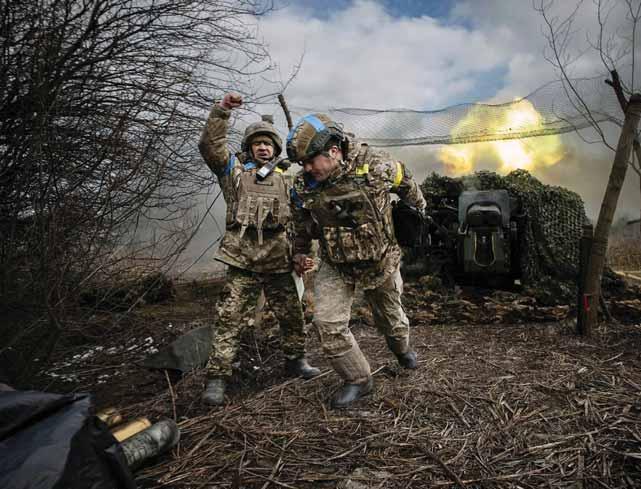
must be rethought, and this requires a multi-page work which is quite impossible at the moment, so we will only talk about a few selectively important issues.
There can be no two opinions that Ukraine must win and Russia must lose. This is what morality demands, what the law demands, what the countries that have suffered from the violation of sovereignty and territorial integrity demand, what the current and tomorrow's interests of civilized nations demand. This is such an axiom that any extended discussion would insult the axiom itself.
Despite this fundamental truth, in the context of the ongoing war in Ukraine as a result of Russian aggression, the question of how to practically understand Ukraine's "victory" and Russia's "defeat" is still a matter of interpretation. This interpretive difficulty is compounded by the operational (executive) difficulty of ensuring Kyiv's victory and Moscow's defeat.
try with respect to the Russia-Ukraine military conflict.
The military specifics of the current war are well known to readers: They are actively and regularly covered in various sources. It is also widely known what advantages the aggressor has at this stage (timely readjustment to a war economy, creation of new markets and suppliers in terms of technology supply, cheap human resources, total control over internal processes, etc.), where and why the victim of aggression has difficulties (lack of human resources, shortage of advanced military equipment, significant delays in delivery of promised conventional weapons, deficiencies in command planning for a new type of war, etc.).
Thus, we will not repeat the military and field aspects and will save our and the reader's time. Undoubtedly, both the West and Ukraine need a critical reassessment of reality, and the sooner the better. Otherwise, it will be very difficult to achieve a tangible result called "victory" in operational and practical terms.
collapse of the Soviet Union, the West's syndrome of geopolitical ambivalence toward certain countries, including Georgia, spilled over with some inertia into the Russian-Ukrainian war. Today, especially given US domestic developments, this syndrome is characterized by "strategic uncertainty" or "strategic haze" and raises a number of uncomfortable questions. As an illustration, suffice it to cite two diametrically different phrases from the US President Biden regarding Ukraine: one in May 2022 about supporting "as long as we need to" and the other in December 2023 about "as long as we are able to."
We are well aware of how trite, and for some, irritating is the phrase that any war ends in negotiation. However, the reality is that humanity has never seen an unfinished war, and virtually all military conflicts have ended with a ceasefire agreement or a politically viable peace agreement. Both outcomes are unthinkable without diplomacy.
is again called the complete surrender of Ukraine, surrender of occupied territories, demilitarization and denazification. Obviously, all of this is non-starter (doomed to failure from the outset) for the peace talks.
Under the current circumstances, it is equally difficult to agree on a ceasefire truce. The crucial issue here is to ensure the stability and inviolability of the ceasefire in such a way that it does not lead, intentionally or unintentionally, to a larger-scale resumption of the hot phase of the conflict in the future. It is no coincidence that in a cerain source even the Second World War is considered a continuation of the unfinished First World War (and this when the armistice of the First World War was replaced by peace agreements a little later).
Speaking of these contradictions, let us recall a relatively positive precedent, namely the armistice related to the Korean peninsula, for the conclusion of which the beginning of communication between the parties coincided not with the subsidence of hostilities, but with their intensification. Moreover, it took the parties two years to reach the actual signing of an approximately forty-page ceasefire agreement. This may not be a particularly convincing argument to a large part of the audience, but perhaps it is a kind of argument that diplomacy is necessary and practically useful in a conflict of any type and scale.
It is also clear that the sustainability of a ceasefire agreement should be determined by a number of practical components. Conventionally, we would divide them into two groups, where one group refers to the operational side of such an agreement and includes, for instance, demilitarized zones, guarantees by a third party (or parties), the functioning of peacekeepers, a mechanism for resolving disputes, etc. It is also important that the language of the agreement be as specific as possible and leave no room for broad interpretation by the parties; Furthermore, a truce agreement should maximize reciprocity between the parties and deter them from using force.
Along with timely and effective military assistance to Ukraine, diplomatic pressure must be equally critical, unambiguously sincere and firm
The complexity of both categories is largely objective: The war between Russia and Ukraine after the end of World War II represents an entirely new type of interstate military confrontation. That is why there are no ready-made recipes aimed at its solution or completion, and the change in the content of the concepts of "victory" and "defeat" occurs in the course of changing dynamics of military actions and international politics.
It is also a fact that time is working against Ukrainians in terms of military operations. The basis for such assertion is the huge human and material losses, as well as the uncertainty that has arisen in the military sphere. The latter is exacerbated by the well-known contradictions of Western domestic politics, the haphazardness of the defense industry in Europe, the inadequate response to Ukraine's needs, the protracted and costly war between Israel and Hamas in the Middle East, and Donald Trump's campaign in the United States, which, even before the election results are in, is seriously affecting the foreign and security line of this highly critical coun-
We have mentioned a new, modern type of war between states, and here we will add something else. In such a war, the result cannot always be expressed geographically - by one or another configuration of the front line on the map.
In other words, the success of international efforts in the war between Russia and Ukraine cannot be considered only the end of hostilities with the desired result. At such times, it is equally, if not more, important to prevent the potential threat of renewed aggression by an aggressor state after the end of the war. This is a much more complex task that cannot be accomplished by military means alone.
One of the main explanations for the "disarmament" of diplomatic efforts could be found in the lack of a clear understanding of the end of the war (endgame). Parallel to the victory-loss equation in the military context, from the beginning of the war until today there has been a high degree of fluctuation in the diplomatic-political arena. After the
We think that at the current stage of the war in Ukraine it is extremely difficult to achieve either of the two mentioned above. In particular, it is still objectively impossible to reach a peace agreement between the warring parties. This is impossible insofar as Russia does not recognize Ukraine's state sovereignty, its international borders and continues its open aggression. In addition, along with a final settlement of pressing political issues, a peace agreement should also address matters such as humanitarian issues, reparations, and criminal offenses. Even setting aside for a moment the issues of sovereignty and territorial integrity, the reader will agree that only an objective investigation of war crimes and punishment of the perpetrators can be an insurmountable obstacle to a peace agreement. However, it is groundless to talk about a peace agreement today as it is, since the positions of Ukraine and Russia on political conditions are radically different, which is natural. A clear example of this huge difference in positions is the recent interview of the Russian President with journalist Tucker Carlson, in which the aggressor's goal
The so-called second group should encourage Ukraine to sign such an agreement, i.e. it should include such components as: implementation of a reliable and credible security system for the country, a serious program and appropriate investments to rebuild the Ukrainian economy, maintenance of the promised sanctions regime against Russia, and firm recognition of the country's international borders, including the temporarily occupied territories.
Thus, we believe that the place of diplomacy is not "superfluous" during the ongoing war in Ukraine, and its silencing or postponement will directly affect both the dynamics of the current conflict and the fate of specific people - the fate of those who are so often forgotten when discussing theoretical and practical aspects of war and diplomacy and unwittingly treated as dry statistics. We believe that now is the time when all methods should be tried, even if they seem completely or so far unpromising. Any other approach will be directly linked to an increase in the scale of the war and direct and indirect damage. Along with timely and effective military assistance to Ukraine, diplomatic pressure must be equally critical, unambiguously sincere and firm, not illusory and half-hearted. Otherwise, as already mentioned, failure first occurs gradually and then happens all at once.
To be continued in next week’s GT.
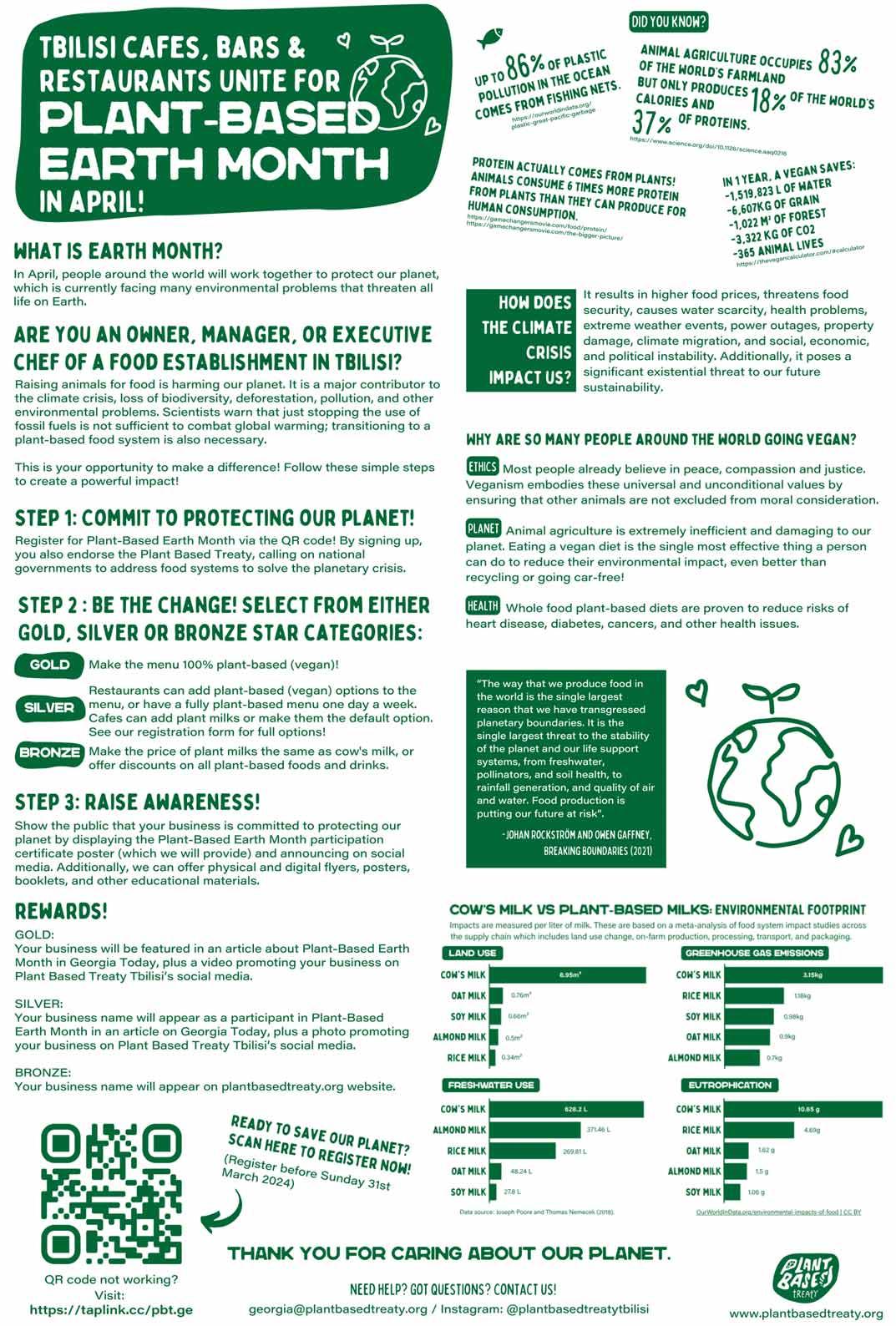

The Asian Development Bank (ADB) launched a new country partnership strategy (CPS) for Georgia that will help develop the country into a green and inclusive regional gateway. The 5-year partnership strategy from 2024–2028 aims for sovereign and private sector investments, policy reforms, capacity building, and knowledge to support Georgia’s sustainable development. The strategy includes a particular focus on regional cooperation and integration, private sector-led growth including support for human capital development, and climate action.
“ADB and Georgia have been steadfast partners and we look forward to further helping the country transition to a green and integrated economy—and foster a more resilient and inclusive society,” said ADB Director General for Central and West Asia Yevgeniy Zhukov. “We will continue to help Georgia leverage its geographical advantage and extensive free trade agreements to become a regional gateway connecting the Caucasus and Central Asia to Europe and the rest of the world.”
Enhancing connectivity, expanding trade, and strengthening human capital are essential to ensure sustainable and inclusive growth in Georgia. They are
also crucial to realizing the nation’s aspirations to become a regional gateway between Europe and Asia, and a member of the European Union. The new CPS directly supports three major priorities in Georgia’s National Development Strategy (Vision 2030)—economic development, social policy and human capital development, and public administration.
“We are proud to maintain our partnership with the government as Georgia continues to develop into a regional transport and trade hub with climateresilient infrastructure and stronger social security,” said ADB Country Director for Georgia Lesley Bearman Lahm. “ADB will build on its strong foundations
as one of Georgia’s largest development partners by providing integrated support for complex infrastructure alongside transformative policy reforms, and enabling private sector development.”
ADB will continue to help Georgia expand its multi-modal transport network, strengthen climate and disaster resilience, and scale up clean energy generation and trade. The bank will continue to support reforms to strengthen social protection in Georgia and the country’s pension systems and capital markets development, while helping to strengthen the nation’s education systems including vocational education and training.
ADB will also help improve the financial viability of Georgia’s large stateowned enterprises by enhancing their governance structures and financial frameworks, and supporting their participation in capital markets.
ADB has supported Georgia since 2007 and is one of the country’s largest multilateral development partners. ADB sovereign and private sector loans to Georgia total $3.9 billion.
ADB is committed to achieving a prosperous, inclusive, resilient, and sustainable Asia and the Pacific, while sustaining its efforts to eradicate extreme poverty. Established in 1966, it is owned by 68 members—49 from the region.
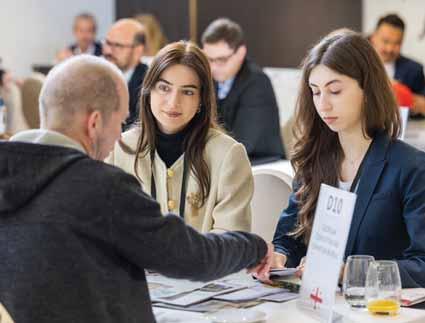 BY MARIAM MTIVLISHVILI
BY MARIAM MTIVLISHVILI
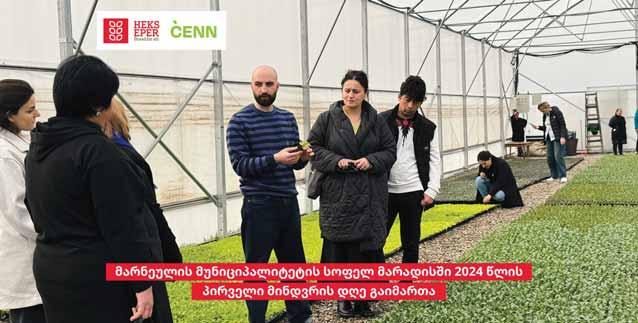
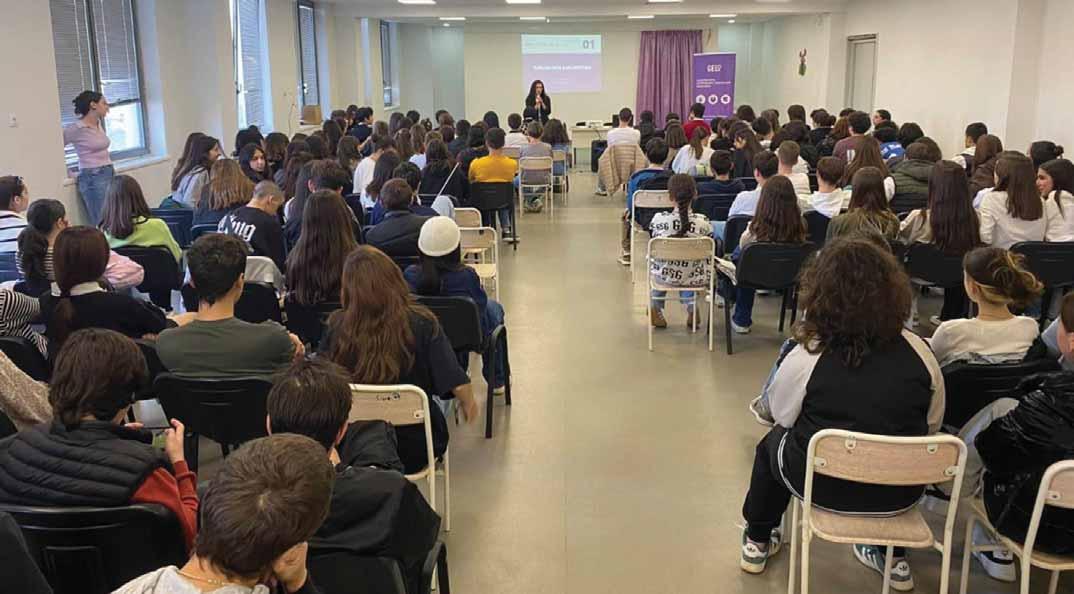 BY SHELBI R. ANKIEWICZ
BY SHELBI R. ANKIEWICZ
Students across Georgia have been introduced to the foundations of finance and economics, with financial education sessions held by Project Harmony (PH) International Georgia’s USAID civics education program.
PH International is an organization based in post-USSR countries that partners with the United States to build communities through civic engagement, cross-cultural learning, and providing opportunities. Marina Ushveridze is the Chief of Party for the USAID civic education program that is implemented through PH International Georgia. The goal of the program is to raise the next generation to be civically active and responsible within their community, while promoting the use of technology in civic education.
The program also emphasizes connecting schools across the country with the private sector so they can receive better civic education. From October until December 2023, the USAID civic education program, in partnership with the Bank of Georgia (BOG) and the Georgian Economic Literacy Initiative (GELI) held financial education sessions at various schools. These occurred in all eleven regions of Georgia, reaching 153 schools and 2,275 students.
The initiative targeted students from grades seven to 12, and representatives
from GELI led the sessions. Bakar Baratashvili, co-founder of GELI, said they used real-life examples so the students could better understand the concepts. He also stressed that they did not want the students to listen, rather, they encouraged everyone to participate.
The sessions were very interactive, with students wanting to both ask questions and answer them. This made Ushveridze feel good, she tells GEORGIA TODAY, because it shows they have a willingness to pay attention and consume as much as possible.
“Very often, the problem with young people is they spend more than they can earn,” Ushveridze notes. “So, financial education is very important at this age, so that kids start practicing smart spending in their everyday lives.”
Topics covered during the sessions varied and provided a foundation for learning about finance. How to invest, inflation, how to earn versus spend, how to choose a profession, how to budget and save money, buying houses, what kind of vacations to take, what is the role of the National Bank of Georgia, what is the role of the government in achieving financial stability – all of these were topics that were covered. Another major area was needs versus wishes, and how to differentiate between them while realizing the answer is not the same for everyone.
“The most important conclusion they made is that it depends on each individual,” Baratashvili tells us. “That’s what we need to learn to think about
- is this really what I need or not? It depends on case to case.”
According to Baratashvili, students weren’t the only ones who were interested in the sessions, as their teachers were also actively involved when talking about monetary policy and hyperinflation during the 1990s. This was brought up to show the usage of coupons throughout the country during that time and to make a point that money can sometimes fail.
Each session had many participants, with the biggest holding roughly 200 students. The idea was for every school to bring a certain number of students; however, numerous students were interested, so more came than were anticipated. Baratashvili said having such a big turnout is great, although as each session was a maximum of one hour, there wasn’t enough time to answer everyone’s questions.
“We did it. We had 200 students in one room, and we still did it well, they still wanted to listen, and they were still happy to attend,” shared Baratashvili. “This means they really have an interest [in this topic].”
A big part of USAID's civic education program and GELI is to connect schools with the private sector across the country. Both organizations agree that financial learning is crucial for becoming a successful and good citizen, especially when it comes to managing and being aware of one’s budget. Baratashvili explains that a big reason the private sector is needed is for the funding of
these projects, and he said that the Bank of Georgia’s support made it possible for them to hold the financial sessions.
Head of the Corporate Social Responsibility Team at BOG, Ana Lomtadze, said they align with PH International’s wanting to increase the private sector's involvement with fi nancial literacy among Georgian schools. She wrote in an email that they believe BOG, along with other businesses, has a responsibility to contribute to this area. In addition to being a part of the financial sessions, the bank has also worked with PH International and their Financial Literacy Olympiad initiative and has partnered with the National Bank of Georgia on other programs.
BOG has also created something in hopes of further helping school children develop in this area.
“We've developed a dedicated financial app, sCool App, the first banking app for school students, specifically designed to engage young minds and promote financial literacy from a formative age,” wrote Lomtadze. “The continued development and expansion of the sCool App, both internally and through partnerships, exemplifies our dedication to amplifying our efforts in this crucial space.”
GELI was created because Baratashvili and his co-founder saw a gap in financial literacy throughout Georgian schools. The organization works with the Economics Fundamental Initiative (EFI) to provide financial literacy
through a simple, easily readable book called ‘Common Sense Economics,’ which was translated into Georgian and is free on the GELI website. In addition to this, the organization has assisted in teaching at schools, conducting teacher training in finance, piloting economic and finance classes, and participating in the Economics Olympiad.
Their main mission is to educate teachers about the basics of finance and economics, so schools can incorporate it into their curriculum and teach students. GELI believes that this subject can go hand in hand with civic education courses that are mandatory for Georgian school children.
Currently, Ushveridze said there is no talk about the financial literacy sessions reoccurring; however, if they were to happen again, there would be communication with the same partners. The sessions were free to attend and took place directly after the school day, making it accessible for students to attend. Ushveridze saw these sessions as a useful reward for students.
“Young people are dreamers, and they should be. This is indeed exciting, but it’s also very nice to see how they start planning specific steps to make their dreams come true,” she notes. “What are the steps to getting closer to the fulfillment of their dreams? Thinking realistically and taking action is important. I think somehow this project, with really short sessions, left them with knowledge lets them be more realistic about their future plans and dreams.”

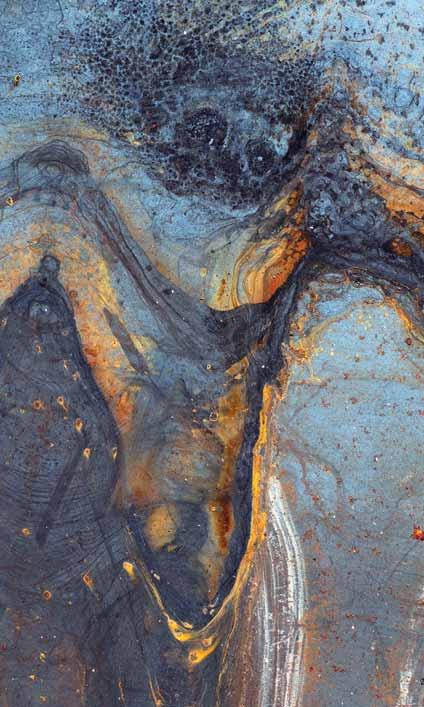

On my way back from Svaneti to Tbilisi a couple of weeks ago, I had a few hours to kill in Zugdidi, arriving before noon and leaving after 5pm. This was mostly because, as I had done on the reverse journey up a week earlier, I would be doing the trip between Zugdidi and Tbilisi by train. It’s marginally cheaper, breaks up the journey, and is way more comfortable too; I would do the whole thing by train every time if the tracks went that far. I had just arranged a ride down to the main road connecting our village with the Zugdidi road, then hitchhiked the 2.5 hours to the capital of Samegrelo, not even bothering to book anything.
Leaving most of my baggage in the railway station’s Left Luggage gave me freedom to walk unencumbered for a few Lari. After lunching, I went to the city’s main steelyard, which has been an important materials supply location for our Svaneti renovation and building work in the last decade. So they know me there, although this was the first time I had asked just to wander around and shoot photos of all that lovely rust. No worries.
This steelyard is maybe a tenth the size of the one I have visited several times in Tbilisi’s Eliava industrial district. But there is still plenty to explore and capture on my camera. I suppose the main thing I had to avoid was bootprints on the stacks of sheet steel; but they were not a major encumbrance. Here, too, is where my favorite images come from: Not the bars or I-beams, which tend to be more heavily rusted- the bluish-tinted sheets with only slight corrosion are where the magic happens.
Some of my best images from this hourlong jaunt include a creature spreading its huge wings, about to fly off. Not a bird, necessarily, because its head is more like a human-shaped thing.
There is a happy couple, maybe just after getting married, aglow with warm colors.
A rather scary teddy bear, like something out of the recent horror film about Winnie the Pooh, Blood and Honey, which I have no interest in seeing. But there he was.
The hint of a man’s head looking right, more present in the outline than interior details. I might just photoshop a profile photo of me into this and see how it looks. (This one has given me the most reactions from the Zugdidi set I posted onto Facebook’s Rust Art group, over 800.)
One I call “Lazarus Emerging from the
Tomb,” although I do still invite viewers to see what they will and apply their own titles to these abstract pieces.
One of the workers had to use an angle grinder to cut a couple of large sections off a big steel sheet while I was there. I waited, far enough away that the noise wouldn’t be painful, for him to finish so I would get a first look at the sheet underneath, a first-time experience for me, kind of like those “unboxing a new product” videos on YouTube. There wasn’t much there, but the cut had magnetized all the steel particles into thin lines of attraction between two of the sheets, which was interesting to see.
As always, my main edits of the shot images were: Cropping to straighten slightly angled lines and eliminate distracting edge details; intensification and correction of the existing colors and contrast. I just strengthen what is there. Rust does the rest.
Tony Hanmer has lived in Georgia since 1999, in Svaneti since 2007, and been a weekly writer and photographer for GT since early 2011. He runs the “Svaneti Renaissance” Facebook group, now with over 2000 members, at www.facebook.com/groups/ SvanetiRenaissance/
He and his wife also run their own guest house in Etseri: www.facebook.com/hanmer.house.svaneti

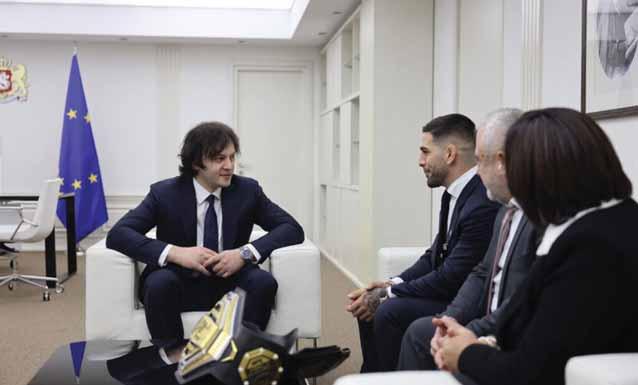
Georgian Prime Minister Irakli Kobakhidze this week met with Ilia Topuria, a Georgian Featherweight Champion of the Ultimate Fighting Championship (UFC).
The 27-year-old athlete knocked out Australia’s Alexander Volkanovski on February 16. The round secured him his 15th consecutive victory in Mixed Martial Arts (MMA). He has had no defeat throughout his career.
The PM congratulated the athlete on his

On March 9-10, the annual international karate championship “Black Belt Cup 2024” was held in Lecco, Italy, in which the Georgian Shotokan Karate Do Confederation team successfully competed.
The World Karate Federation (W.U.K.F.) organized the competition in Italy. At this prestigious tournament, where 1500 athletes from 20 countries took part, Georgian karate players won a total of 7 medals: 1 gold, 4 silver and 2 bronze medals.
11-year-old Andria Saatashvili, a twotime winner of European and many international tournaments, competed successfully. This time, he took first place and a gold medal in the absolute category of kumite among 11-year-old boys at the International Karate Championship in
victory and pointed out that this is an achievement that Georgia and the Georgian people cherish and take pride in. Kobakhidze asked after Ilia Topuria’s plans for the future, and wished him success.
In a conversation with the champion, the Prime Minister emphasized that, alongside receiving Spanish citizenship, it is also important for Topuria to keep his Georgian citizenship. The Head of Government will address the Justice Ministry and the President to do everything for Ilia Topuria to keep Georgian citizenship.
The UFC champion, was visiting Georgia at the Prime Minister’s invitation. A crowd of his fans and journalists greeted him at the Tbilisi International Airport.
Topuria presented his championship belt at the Georgia-Luxemburg football match on March 21.
On Thursday, the PM and the Speaker of Parliament nominated Topuria for the Order of Honor, submitting their request to the President of Georgia.
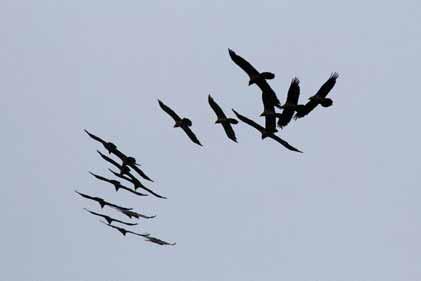
TRANSLATED FROM GEORGIAN INTO ENGLISH BY KETEVAN
TUKHARELIGivi Gegechkori (1933 to 2002) was born in Tbilisi. He graduated from the journalism department of the Faculty of Philology of Tbilisi State University in 1956. He is best known for his collection of poems The Light of Pale Snow (1998), a collection of letters The Branch of Kindness (1985), children's book The Life of Ilia Chavchavadze (1997), and Anthology of French Poetry (1990).
I THOUGHT IT WAS A LITTLE FAR
Oh, my sisters!..
April and May, You have come And relieved my heart, I thought winter Was a little far... And let it be thus...
How sadness will Be my friend, When you look at me
With love, I thought winter Was a little far... And let it be thus...
Italy. In addition to this result, he also won 2 bronze medals in individual kumite +45 kg weight category and individual kata among 11-year-old boys.
Chabuka Makharadze, a four-time world and five-time European champion, as well as a winner of many international tournaments, an athlete with the V blade of the black belt, took the silver medal in the absolute weight category of the individual kumite among adults.
9-year-old Elene Bobokhidze took part in the international tournament for the first time, and confidently competed among 8-9-year-old girls in individual kumite and kata disciplines, winning 3 silver medals at once.
Chabuka Makharadze, silver prizewinning athlete of the international tournament “Black Belt Cup 2024” in Italy: “Black Belt Cup 2024 is a traditional shotokan karate international championship, which was held this year in the city of Lecco, near Milan, Italy. I have successfully participated in this tournament for the third time and I want to tell you that this year the championship was organized at a very high level, competitions were held on 6 mats at the same time for two days in the big sports complex.
“During the competition in the absolute category of kumite among seniors, I went through 3 rounds: in the first round
PUBLISHER & GM
George Sharashidze
COMMERCIAL DEPARTMENT
Commercial Director: Iva Merabishvili
Marketing Manager: Natalia Chikvaidze
EDITORIAL DEPARTMENT:
Editor-In-Chief: Katie Ruth Davies
I beat Samuel Ramanes (Romania) 3:0, in the second round I won 5:1 against Luca Marconi (Italy), in the third round I lost 4:5 to the Italian athlete Paulo Simiones, but the fight was equal. It should be noted that at such international championships, all athletes are distinguished by their high professionalism, they are prepared at a high level, the competition is also great, and I am trying to carry the name of our country in a dignified way.
“My 11-year-old student Andria Saatashvili successfully competed in Italy. Although he has been practicing karate under my instructor for 4 years, he has already had serious success in international tournaments and this time he competed successfully. He won the 1st place and the gold medal among 10-11-yearold boys in the absolute category of kumite. He passed 5 rounds and won 4 bouts convincingly: in the first round he beat Samuel Guidone (Italy) 3:1, in the second round he beat Stefano Martinez (Italy) 4:2, in the third round he beat Hugo Lorenzo (Italy) 4:2, and in the fourth round he beat Federico Giovanni. 4:0. In addition, he won 2 bronze medals in individual kumite +45 kg weight category and individual kata among 11-yearold boys.
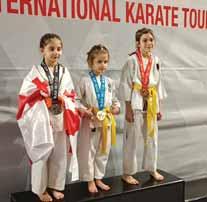
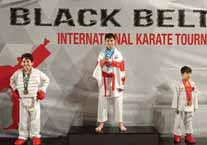
successful. She competed among 8-9-yearold girls in individual kumite and kata disciplines and won three silver medals at once. Elena had to fight three matches in individual kumite, in the first round she defeated Ludmila Marconi (Italy) with a score of 3:0, she also won against Marek Stefani (Italy) 4:2, and in the third round she lost to Barbara Giovannisi (Italy) 3:2. There were 18 participants in the cat in its age category. Barbara Ilaski (Italy) took the 1st place, Elena won the silver medal in the 2nd place, and Livjul Anderski (Slovenia) took the 3rd place. Elene Bobokhidze has been training in karate for 2 years in Kutaisi, her coach is Vazha Ungiadze, senior instructor, owner of black belt and VI Dan.
“The kids at this big international tournament in Italy were very happy to get high quality medals in the prize places. I hope that we will continue like this, because these victories are very important for me and my team, an incentive, more motivation to compete again in the future and spotlight Georgia.”
“There were 25 participants in the individual cat discipline, but in the conditions of such high competition, Andria was able to take the 3rd place and get a bronze medal, Marek Martinez (Italy) took the 1st place, and Stefane Livorini (Italy) took the 2nd place.
Journalists: Ana Dumbadze, Vazha Tavberidze, Tony Hanmer, Nugzar B. Ruhadze, Mariam Mtivlishvili, Erekle Poladishvili, Shelbi R. Ankiewicz
Photographer: Aleksei Serov
“The debutant of the international tournament was 9-year-old Elene Bobokhidze, and I am glad that her international competition turned out to be so
At the tournament, as the head of the Georgian delegation, Chabuka Makharadze was presented with a special prize by the organizing group of the competition, the Sports Karate Union (Unione Karate Sportivo) and Guido Rossini, the official representative of the WUKF in Italy.
Website Editor: Katie Ruth Davies
Layout: Misha Mchedlishvili
Webmaster:
Sergey Gevenov
Circulation Managers: David Kerdikashvili, David Djandjgava
ADDRESS
1 Melikishvili Str. Tbilisi, 0179, Georgia
Tel.: +995 32 229 59 19
E: info@georgiatoday.ge
F: GeorgiaToday
ADVERTISING &
+995 555 00 14 46
E-mail: marketing@georgiatoday.ge
Reg.
